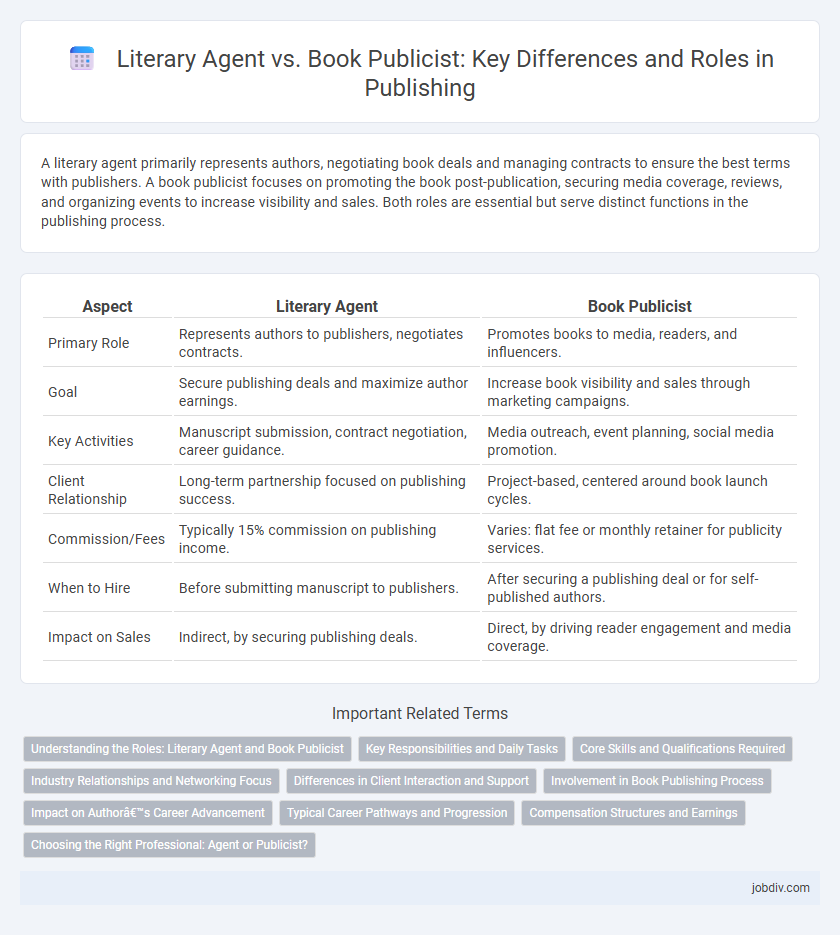A literary agent primarily represents authors, negotiating book deals and managing contracts to ensure the best terms with publishers. A book publicist focuses on promoting the book post-publication, securing media coverage, reviews, and organizing events to increase visibility and sales. Both roles are essential but serve distinct functions in the publishing process.
Table of Comparison
| Aspect | Literary Agent | Book Publicist |
|---|---|---|
| Primary Role | Represents authors to publishers, negotiates contracts. | Promotes books to media, readers, and influencers. |
| Goal | Secure publishing deals and maximize author earnings. | Increase book visibility and sales through marketing campaigns. |
| Key Activities | Manuscript submission, contract negotiation, career guidance. | Media outreach, event planning, social media promotion. |
| Client Relationship | Long-term partnership focused on publishing success. | Project-based, centered around book launch cycles. |
| Commission/Fees | Typically 15% commission on publishing income. | Varies: flat fee or monthly retainer for publicity services. |
| When to Hire | Before submitting manuscript to publishers. | After securing a publishing deal or for self-published authors. |
| Impact on Sales | Indirect, by securing publishing deals. | Direct, by driving reader engagement and media coverage. |
Understanding the Roles: Literary Agent and Book Publicist
A literary agent negotiates publishing contracts, secures book deals, and manages the author's rights, focusing on the business side of book publishing. A book publicist designs marketing campaigns, coordinates media coverage, and promotes the book to boost visibility and sales after publication. Understanding these distinct roles helps authors effectively navigate the publishing process and maximize their book's success.
Key Responsibilities and Daily Tasks
A literary agent primarily focuses on acquiring book deals by negotiating contracts and securing publishing opportunities for authors, handling rights sales, and guiding the overall career strategy. A book publicist concentrates on marketing and promotion, developing press releases, coordinating book tours, managing media relations, and generating publicity to increase book visibility and sales. Both roles are essential for an author's success but differ significantly in their daily tasks, with agents centered on business negotiations and publicists on audience engagement.
Core Skills and Qualifications Required
Literary agents require strong negotiation skills, industry knowledge, and the ability to identify marketable manuscripts, with qualifications often including experience in publishing or literary fields. Book publicists need expertise in media relations, marketing strategies, and social media management to effectively promote titles, typically holding backgrounds in communications or public relations. Both roles demand excellent communication skills and a deep understanding of the book market but focus on different stages of the publishing process.
Industry Relationships and Networking Focus
Literary agents cultivate long-term relationships with publishers, editors, and authors to negotiate book deals and secure publishing contracts, leveraging their industry connections to advance an author's career. Book publicists specialize in media relations, connecting with journalists, bloggers, and influencers to generate publicity and promote book releases. While agents focus on contract negotiations and rights management, publicists prioritize building networks within media and events to maximize a book's visibility.
Differences in Client Interaction and Support
Literary agents primarily negotiate publishing contracts, secure book deals, and provide editorial guidance, maintaining long-term relationships with authors to support their careers. Book publicists focus on promoting completed works through media outreach, book tours, and social media campaigns, engaging with the public and press to maximize visibility. While agents manage business aspects and rights sales, publicists concentrate on marketing strategies and boosting book sales post-publication.
Involvement in Book Publishing Process
Literary agents primarily focus on representing authors by negotiating publishing contracts and securing book deals with publishers, playing a crucial role early in the book publishing process. Book publicists specialize in marketing and promoting the finished book to maximize visibility, media coverage, and sales, engaging mainly after the publication phase. Both roles are integral but target different stages within the overall publication lifecycle.
Impact on Author’s Career Advancement
A literary agent plays a crucial role in an author's career by securing publishing deals, negotiating contracts, and guiding long-term career strategy, which directly impacts the author's financial success and industry standing. A book publicist, on the other hand, focuses on marketing efforts that increase a book's visibility through media coverage, book tours, and social media campaigns, driving sales and reader engagement. Together, these professionals enhance an author's career advancement by combining strategic deal-making with targeted promotional activities.
Typical Career Pathways and Progression
Literary agents typically begin their careers as editorial assistants or interns at publishing houses, gradually advancing to roles where they acquire and manage authors' rights, negotiate contracts, and build an author roster. Book publicists often start in entry-level marketing or communications positions within publishing firms or PR agencies, developing skills in media outreach, event coordination, and campaign strategy to promote book titles effectively. Career progression for literary agents often leads to senior agent or agency director roles, while publicists can advance to senior publicity director or marketing manager positions within publishing or specialized PR firms.
Compensation Structures and Earnings
Literary agents typically earn 15% commission on an author's book sales and related rights, aligning their income with the book's commercial success. Book publicists often charge flat fees or monthly retainers ranging from $1,000 to $5,000 per campaign, independent of sales performance. While agents' earnings fluctuate based on royalties and advances, publicists receive more predictable, upfront compensation for marketing services.
Choosing the Right Professional: Agent or Publicist?
Choosing the right professional between a literary agent and a book publicist depends on an author's career stage and goals; literary agents specialize in securing publishing deals and negotiating contracts, while book publicists focus on marketing strategies, media outreach, and audience engagement. Authors seeking representation for manuscript acquisition and publisher connections should prioritize literary agents, whereas those aiming to boost book visibility, sales, and brand awareness benefit from hiring experienced book publicists. Understanding the distinct roles and industry expertise of both professionals ensures tailored support for a successful publishing journey.
Literary Agent vs Book Publicist Infographic

 jobdiv.com
jobdiv.com